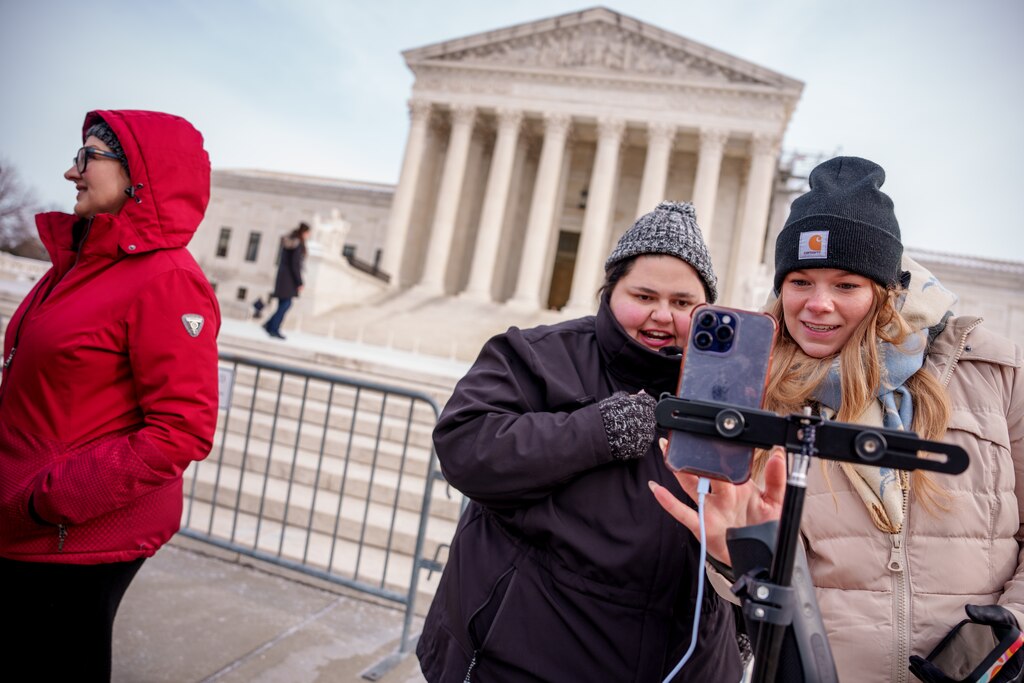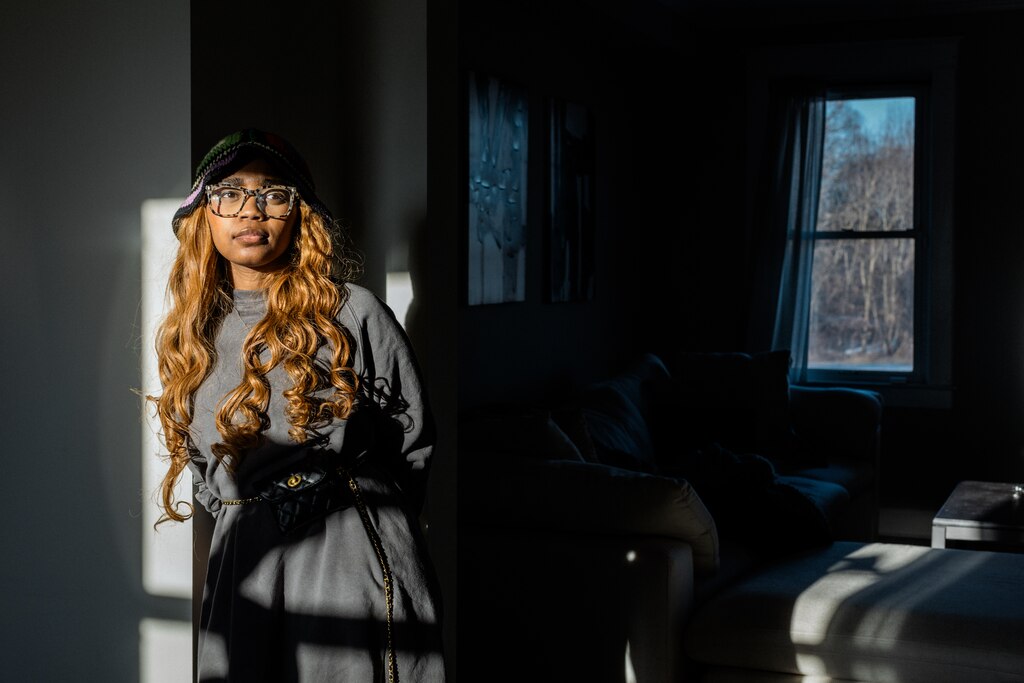The clock is ticking for one of America’s favorite social media platforms, and Baltimore’s TikTok stars big and small are figuring out what they’ll do if they lose the app — and the money they make from it.
“As a creator, of course, I’m going to be bummed and disappointed because I have spent the last year posting five times a day and going through the typical trials and tribulations of being an aspiring creator,” said Jaqueline Ryan, who is known as “glutenfreejackie” on TikTok.
The federal government has given TikTok’s Chinese parent company, ByteDance, an ultimatum: Sell to a U.S. company by Sunday or get banned.
Congress, with the support of President Joe Biden, passed a law last April that would block the social media company in America because of what they called national security concerns that come with its ties to China. In a final fight to preserve the app, lawyers for TikTok and its users told the U.S. Supreme Court on Friday that a ban would constrain First Amendment rights. A ruling is expected soon.
The Baltimore Banner thanks its sponsors. Become one.
With around 170 million U.S. users by some estimates, TikTok isn’t just for time-sucking doomscrolling. It has become a powerful marketing and business-generating machine. The “creator economy,” as it’s known, yielded around $250 billion in 2023, according to Goldman Sachs, and could grow to $480 billion by 2027.

TikTok has put Maryland on the national, if not global, stage.
Read More
The “Keith Lee effect” boosted Baltimore’s Rooted Rotisserie and Hollins Market last year. Eastern Shore waterman Luke McFadden has grown a following of more than 1 million on the app. Even earwax in Owings Mills and a Park Heights groove have grabbed the spotlight.
Ryan, 24, started posting on TikTok in 2020 and has a following of nearly 263,000. She has collected 53.7 million likes across her videos. She moved to Baltimore from Fredrick to start her career in sales, but also earns money from social media.
“At the end of the day, I will just pack it up and post somewhere else because I have a passion for this, and I love making people laugh,” Ryan said.
The Baltimore Banner thanks its sponsors. Become one.
President-elect Donald Trump, who takes office Monday, could save the app from its demise. Near the end of his first term, he issued an executive order imposing sanctions over the app’s ties to China, but it had little impact.
More recently, Trump, who has 14.7 million followers on the platform, said he “had a very good experience with TikTok” leading up to the election. He asked the Supreme Court to pause the ban until his administration can weigh in.
If they lose TikTok, content creators and marketing companies said they would turn to other social media platforms, and experts have said Meta, which owns Facebook, Instagram and Threads, has the most to gain from the downfall of TikTok. Some also plan to migrate to YouTube, the video platform owned by Google.
Both platforms have a TikTok equivalent — YouTube Shorts and Instagram Reels — but neither is ideal, Ryan said. “It feels weird and cringy to post on Instagram Reels.”
ByteDance, knowing what might come, has pushed users and content creators to its other app, Lemon8, that’s reminiscent of Pinterest. There’s rapidly growing interest in other Chinese apps like RedNote. Those are less popular — and might be banned down the line.
The Baltimore Banner thanks its sponsors. Become one.
“You would have to build a super cult following or a big brand to feel confident that no matter what platform you go to, these people will follow you and you’ll be successful with brand deals and ad revenue,” said Kendall McGill, a Baltimore resident known as “BobbieBeaut” on TikTok.
Followers are essential for making money off TikTok or any other social media platform. They reflect an account’s reach and, for companies looking to advertise, how many eyes they can get on their products or services.

McGill, 31, works full-time as a project manager in health care. She started creating content on YouTube as a college student in 2014 and added TikTok to the mix in late 2022. She now has around 112,800 followers and more than 9 million likes on TikTok.
The money she earns from social media primarily comes from brand deals with companies.
Here’s how that works: A brand hires a content creator to make and post a video featuring the company’s product or service. The creator’s earnings are tied to how many followers they have.
The Baltimore Banner thanks its sponsors. Become one.
McGill said she earns about $5,000 a month from such deals. Without TikTok, she expects to take a big financial hit.
Others on TikTok use the app’s “Creator Fund,” which pays users for making videos, though the payout varies greatly and rarely leads to the kind of money that comes from brand deals.
Chi Yan, a Baltimore-based real estate agent known as “hchitv” on TikTok, said he has earned about $2,500 over the last few months, but what benefits him more are the home sellers and buyers who have found him through the app.
Yan, 50, has used a variety of social media platforms for personal and professional use, starting with Facebook, then Instagram and Snapchat. He migrated to TikTok in 2020, like many of the app’s users. He has amassed nearly 34,000 followers and 1.4 million likes across his videos about Baltimore, home-buying and homeownership.
Yan said he objects to the government’s move to ban TikTok, saying the platform is “the most free social media platform for people to express themselves.”
The Baltimore Banner thanks its sponsors. Become one.
Advertising agencies know that content creators provide a lot of value to companies. Instead of ending contracts if TikTok is banned, they’re likely to find other avenues to work with influencers on other social media platforms.
“I don’t think that there are going to be just out-of-work TikTokkers walking around — because they are talented, and they understand their audience and the nuance of creating entertaining video,” said Ashlene Larson, director of public relations and social media at Planit, a marketing and advertising agency in Baltimore. “I think those videos will just have another home.”
Natalie Contrera, co-founder of the Baltimore-based Mango Marketing Co., said she has advised her clients against solely relying on social media apps in favor of more stable channels for marketing.
“You can get hacked on Instagram. Meta can go down, and Twitter got bought out by somebody, changed its name, and a lot of people left,” she said. “You own your website, you own your blog, you own your domain, you own your email list.”
Many are hopeful TikTok won’t be banned, but with time running out, Yan said he fears “all of the work we’ve done is gone.”




Comments
Welcome to The Banner's subscriber-only commenting community. Please review our community guidelines.